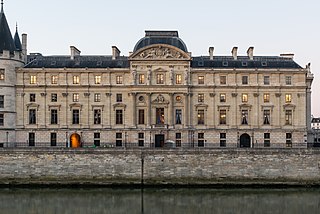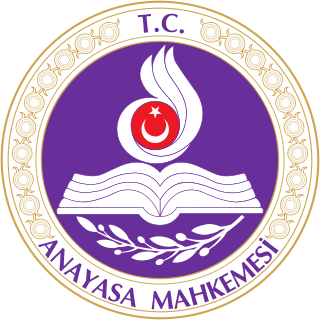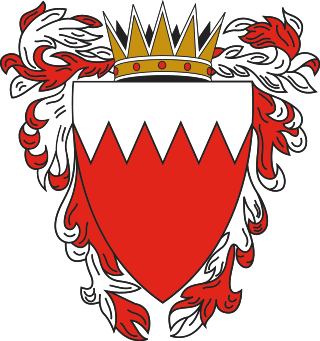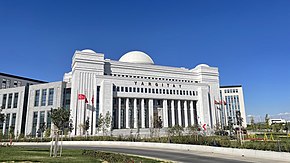
The Court of Cassation is the supreme court for civil and criminal cases in France. It is one of the country's four apex courts, along with the Council of State, the Constitutional Council and the Jurisdictional Disputes Tribunal.

The Supreme Court of Ukraine is the highest judicial body in the system of courts of general jurisdiction in Ukraine.

France's independent court system enjoys special statutory protection from the executive branch. Procedures for the appointment, promotion, and removal of judges vary depending on whether it is for the ordinary or the administrative stream. Judicial appointments in the judicial stream must be approved by a special panel, the High Council of the Judiciary. Once appointed, career judges serve for life and cannot be removed without specific disciplinary proceedings conducted before the council with due process.

The Judiciary of Russia interprets and applies the law of Russia. It is defined under the Constitution and law with a hierarchical structure with the Constitutional Court and Supreme Court at the apex. The district courts are the primary criminal trial courts, and the regional courts are the primary appellate courts. The judiciary is governed by the All-Russian Congress of Judges and its Council of Judges, and its management is aided by the Judicial Department of the Supreme Court, the Higher Qualification Board of Judges, and the Ministry of Justice, and the various courts' presidents. And although there are many officers of the court, including jurors, the Prosecutor General remains the most powerful component of the Russian judicial system.

The Supreme Court of the Netherlands, officially the High Council of the Netherlands, is the final court of appeal in civil, criminal and tax cases in the Netherlands, including Curaçao, Sint Maarten and Aruba. The Court was established on 1 October 1838 and is located in The Hague.

The judicial system of Turkey is defined by Articles 138 to 160 of the Constitution of Turkey.
In France, a cour d'assises, or Court of Assizes or Assize Court, is a criminal trial court with original and appellate limited jurisdiction to hear cases involving defendants accused of felonies, meaning crimes as defined in French law. It is the only French court that uses a jury trial.

The judicial system of Egypt is an independent branch of the Egyptian government which includes both secular and religious courts.

The Court of Cassation of Belgium is the supreme court of the Belgian judiciary. The court is composed of thirty judges with life tenure who are nominated by the High Council of Justice of Belgium and appointed by the Belgian federal government. The court handles cases in the two main languages of Belgium, Dutch and French, and provides certain facilities for cases in German. The court is assisted in its work by a public prosecutor's office and a bar association, which both function separately from other structures. The duty of the public prosecutor's office is to provide advisory opinions to the court on how the law ought to be interpreted and applied. The attorneys of the court's bar association assist litigants in proceedings before the court; in certain cases, their assistance is mandatory.

In most legal jurisdictions, a supreme court, also known as a court of last resort, apex court, and highcourt of appeal, and court of final appeal, is the highest court within the hierarchy of courts. Broadly speaking, the decisions of a supreme court are binding on all other courts in a nation and are not subject to further review by any other court. Supreme courts typically function primarily as appellate courts, hearing appeals from decisions of lower trial courts, or from intermediate-level appellate courts. A supreme court can also, in certain circumstances, act as a court of original jurisdiction.

The Constitutional Court of Turkey is the highest legal body for constitutional review in Turkey. It "examines the constitutionality, in respect of both form and substance, of laws, decrees having the force of law, and the Rules of Procedure of the Turkish Grand National Assembly". If necessary, it also functions as the Supreme Criminal Court to hear any cases raised about the President, Vice President, members of the Cabinet, or judges of the high courts. In addition to those functions, it examines individual applications on the grounds that one of the fundamental rights and freedoms within the scope of the European Convention on Human Rights which are guaranteed by the Constitution has been violated by public authorities.

The courts of appeal are the main appellate courts in the judicial system of Belgium, which hear appeals against judgements of the tribunals of first instance, the enterprise tribunals and the presidents of those tribunals in their judicial area. There are five courts of appeal for each of the five judicial areas, which are the largest geographical subdivisions of Belgium for judicial purposes. The division of the Belgian territory into the five judicial areas is laid down in article 156 of the Belgian Constitution. A judicial area covers multiple judicial arrondissements ("districts"), except for the judicial area of Mons. Each arrondissement has a tribunal of first instance. Further below, an overview is provided of the five courts of appeal and the judicial arrondissements their judicial area covers. The courts of appeal do not hear appeals against judgements of the labour tribunals; these are heard by the courts of labour.

The judiciary of the Republic of Chile includes one Supreme Court, one Constitutional Court, 17 Courts of Appeal, 84 Oral Criminal Tribunals and Guarantee Judges; 7 Military Tribunals; over 300 Local Police Courts; and many other specialized Tribunals and courts in matter of family, labor, customs, taxes, electoral affairs, etc.

The Judiciary of Spain consists of Courts and Tribunals, composed of judges and magistrates (Justices), who have the power to administer justice in the name of the King of Spain.

The Supreme Court is the court of last resort in Serbia which reviews and possibly overturns previous rulings made by lower courts.

The judicial system of Syria is a synthesis of Ottoman, French, and Islamic laws. The civil, commercial and criminal codes are primarily based on the French legal practices. Promulgated in 1949, those laws have special provisions sanctioned to limit application of customary law among beduin and religious minorities. The Islamic religious courts continue to function in some parts of the country, but their jurisdiction is limited to issues of personal status, such as marriage, divorce, paternity, custody of children, and inheritance. Nonetheless, in 1955 a personal code pertaining to many aspects of personal status was developed. This law modified and modernized sharia by improving the status of women and clarifying the laws of inheritance.

The Supreme Court of the Republic of Albania is the highest court of Albania and is the final court of appeals in the country's judicial system. It is composed of seventeen judges: the Chief Justice and sixteen Members.

The judiciary of Bahrain is a system of three courts that interpret and apply the laws of the Kingdom of Bahrain. Namely, these three courts are the Civil Courts, Sharia Courts, and Criminal Courts. Civil Courts have jurisdiction to adjudicate all commercial, civil, and administrative disputes, as well disputes related to the personal status and domestic relations of non-Muslims. The Sharia Courts, which apply Sharia law, have jurisdiction over all aspects of the personal status of Muslims. Criminal Courts have the jurisdiction to deal with criminal matters.

The Supreme Court of the Dominican Republic is the highest court existing in the Republic and is, therefore, the head of the judiciary in the country.
On 8 November 2023 a constitutional crisis unfolded in Turkey between the Court of Cassation and the Constitutional Court when the Court of Cassation intervened to overturn a ruling by the Constitutional Court regarding the release of an imprisoned member of the Turkish Parliament, Can Atalay.






















